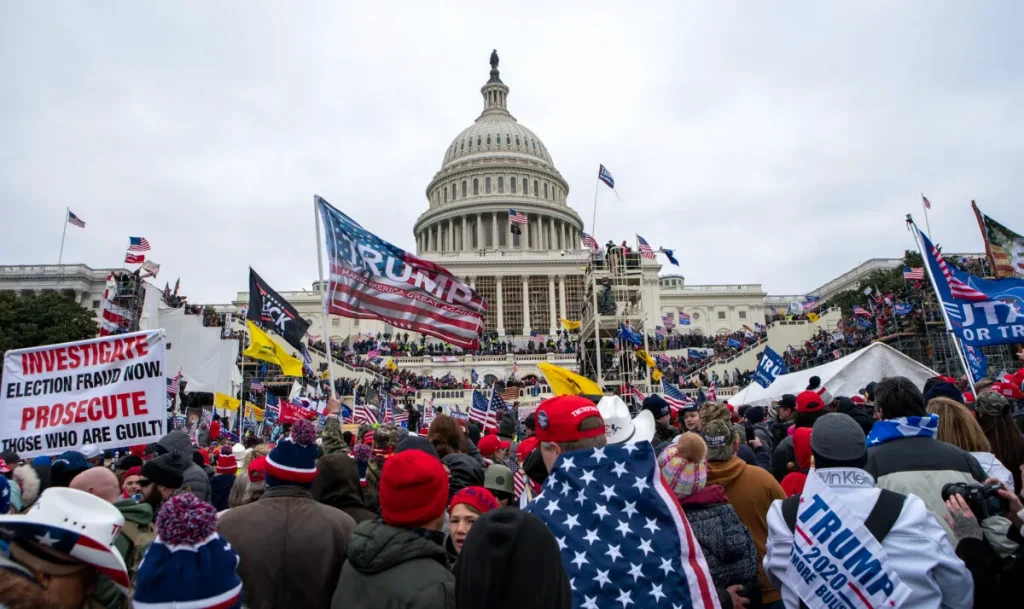Rogers Roots, an attorney representing Dominic Pezzola, a Jan. 6, 2021, Capitol breach defendant, alleged on Sunday that the FBI had committed crimes by altering evidence and requested that the court appoint a special master to review the evidence.
Roots’s move came days after the testimony of FBI Special Agent Nicole Miller, who was involved in the agency’s investigations of the Jan. 6 defendants. When cross-examining Miller, Nick Smith, an attorney representing Proud Boys member Ethan Nordean (listed as co-defendant on Pezzola’s case), revealed classified FBI emails that were hidden in a tab in an Excel spreadsheet, which included a directive to Miller to “destroy” 338 pieces of evidence and “edit out” an FBI agent from an informant report.
“Destroying evidence is a federal crime. It actually falls under a federal crime under more than one statute. The same goes with altering documents, altering records, that is a federal crime,” the John Pierce Law attorney told The Epoch Times in an interview on Sunday.
In a filing on Sunday, Roots requested that Timothy J. Kelly, a Trump appointee presiding over the case, either dismiss the case in its entirety or appoint a special master to independently review the FBI messages that were revealed in court.
“The unceremonious and uninhibited nature of Miller’s discussion of committing these serious crimes suggests an FBI culture of corruption and lawlessness that must be immediately stopped, and fully investigated,” Roots said in the filing.
“Accordingly, this case must be dismissed en toto and with prejudice,” Roots’s filing continues. “Even if the Court were to overlook this massive trail of FBI corruption and the trial were to proceed, defendants have a right to cross-examine Agent Miller regarding all of these crimes, her missing emails, her discussions of violating defendants’ 6th amendment rights, her discussions of evidence tampering, and her discussions of altering documents involving [confidential human sources] in this case.”
The Leaked Messages
A key question about these leaked messages is whether they fall under the scope of evidence in the case.
“Miller’s hidden messages reveal casual discussions among the FBI regarding the monitoring of codefendant Rehl’s trial strategy, Rehl’s defenses and ‘interesting’ points, and ways the government can get around Rehl’s defenses,” Roots said in the Sunday filing.
In the filing, Roots requested the court dismiss Pezzola’s case with prejudice, appoint a special counsel, appoint a special master, schedule extensive evidentiary hearings, and release Pezzola from custody.
The DOJ, on the other hand, said that because Rehl and his attorney were communicating over a monitored prison system, they waived the right to attorney-client privileges.
“The government has not obtained any privileged communications between defendant Rehl and Moseley,” the government wrote in response to Roots’s contentions in a filing on Sunday. “As the government explained in a separate filing … Rehl and Moseley made a fully informed choice to communicate with one another over a monitored jail email system. In doing so, they waived any privilege.”
Further, the DOJ said Roots’s argument about the government destroying evidence is void, arguing that the messages are unrelated to the case.
“This ‘destruction’ of evidence related to the disposition of 338 items of evidence from a nearly 20-year-old multi codefendant trial,” the DOJ said in a separate filing on Sunday. “Pursuant to policy, the FBI waited to dispose of the evidence until all defendants’ appellate rights were extinguished.”
“The special agent disposed of this evidence by returning it to defendants’ family members or otherwise destroying it pursuant to FBI policy. The case was not related to this prosecution, and the agent was not involved in this investigation,” the DOJ’s filing reads.
The government then argued that Pezzola had not demonstrated that he suffered “injury” or material damages in the trial as a result of the government’s collections, citing United States v. Mastroianni, which says “a Sixth Amendment violation cannot be established without a showing that there is a ‘realistic possibility of injury’ to defendants or ‘benefit to the State’ as a result of the government’s intrusion into the attorney-client relationship.
But according to Roots, the messages, at minimum, deserve a deeper look.
“Put it this way: it cries out for someone to investigate it,” Roots told the Epoch Times on Sunday, referring to the leaked messages.
“I believe that the trial needs to come to a halt while we investigate these questions,” Roots said.
The FBI declined to comment and referred The Epoch Times to the U.S. Attorney’s Office for comment.
U.S. Attorney’s Office did not provide The Epoch Times with comment by press time.


